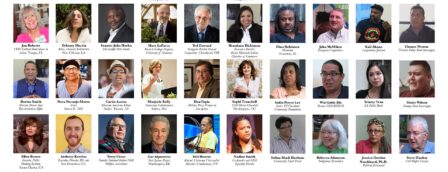 New Indian organizations combat stereotypes and foster leadership in innovative ways—from building a skate park to aid in suicide prevention to partnering with college sports teams named for tribes.
New Indian organizations combat stereotypes and foster leadership in innovative ways—from building a skate park to aid in suicide prevention to partnering with college sports teams named for tribes.
Darius Smith has a varied and rich career in educational & cultural affairs; Native People’s Initiative-Habitat for Humanity Int’l, Alma Curriculum & Teacher Training-Denver Public Schools, American Indian Liaison-City & County of Denver and current positions: City of Denver Anti-Discrimination Office Director and Adjunct Ethnic Studies-University of Colorado.
Food For Thought & Conversation
- The silence that has shrouded suicide in Indian country is being pierced by growing alarm at the sheer numbers of young Native Americans taking their own lives — more than three times the national average, and up to 10 times the average on some reservations. Please share your reaction and thoughts concerning The Stronghold Society’s positive approach to youth to prevent suicide.
- Expand your conversation to the stereotyping of other minority groups. If desired, please share any personal experience with stereotyping you have had.
- Personally, when someone is being negatively stereotyped in your company, how do you react? Most of us would like to think we would speak up but in reality, how often do you think that is true? If you have spoken up, what reaction did you get and do you think you changed anyone’s mind? Is there a more effective way to change hearts and minds?
- How powerful to you think the stereotyping of American Indians by sports team is on influencing people’s perception of American Indians?
Actions
- Research to learn if your community has an American Indian Commission. If so, please share what they are doing to decrease stereotyping and support American Indians in your community. If not, why not?
- Does your local college or university have a sports team that stereotypes American Indians? If so, have their been dialogues with the local tribes to negotiate use of the name or to rename the team?
- Are their organizations in your community that combat stereotyping and mistreatment of minority groups? If so, how could you support them?
- Invite your friends, colleagues or community members to view this video with you and host a conversation.
Additional Information
80% of Native Americans do not live on reservations but in cities.Currently, almost a third of American Indians in the United States live on reservations, totaling approximately 700,000 individuals. About half of all American Indians living on reservations are concentrated on the ten largest reservations. Gaming on Indian reservations has not appreciably lowered the high levels of poverty on Indian lands nationwide. According to a “Survey of Grant Giving by American Indian Foundations and Organizations” by Native Americans in Philanthropy, the needs of reservation Indians are so great that even if the total annual Indian gaming revenue in the country could be divided equally among all the Indians in the country, the amount distributed per person would still not be enough to raise Indian per capita income (currently $11,259) to anywhere near the national average of $21,587. Of the more than 560 Indian nations, only 224 are involved in gaming. Many tribes may never participate in gaming because of their geographic location in rural, unpopulated areas.
[ultimate-recipe id=”7076″ template=”101″]
